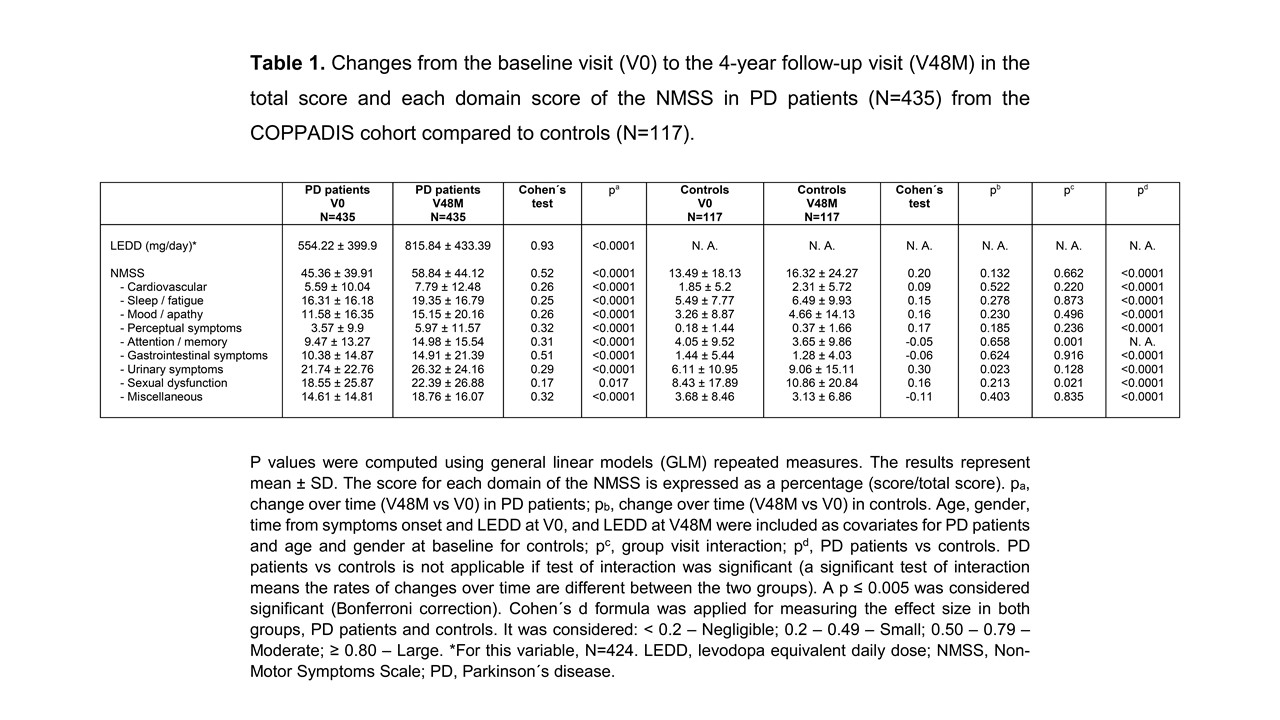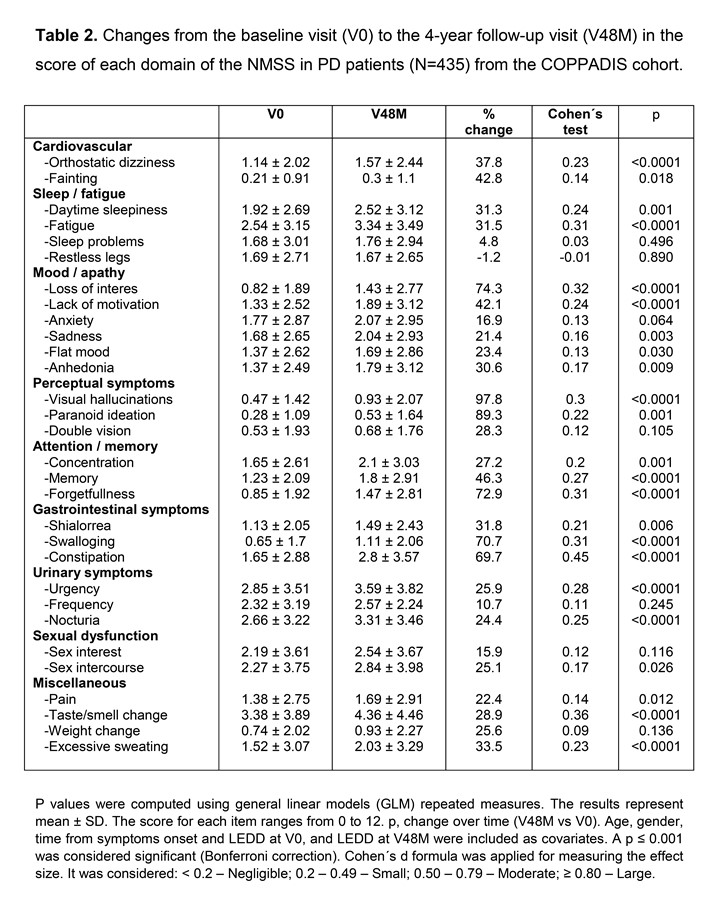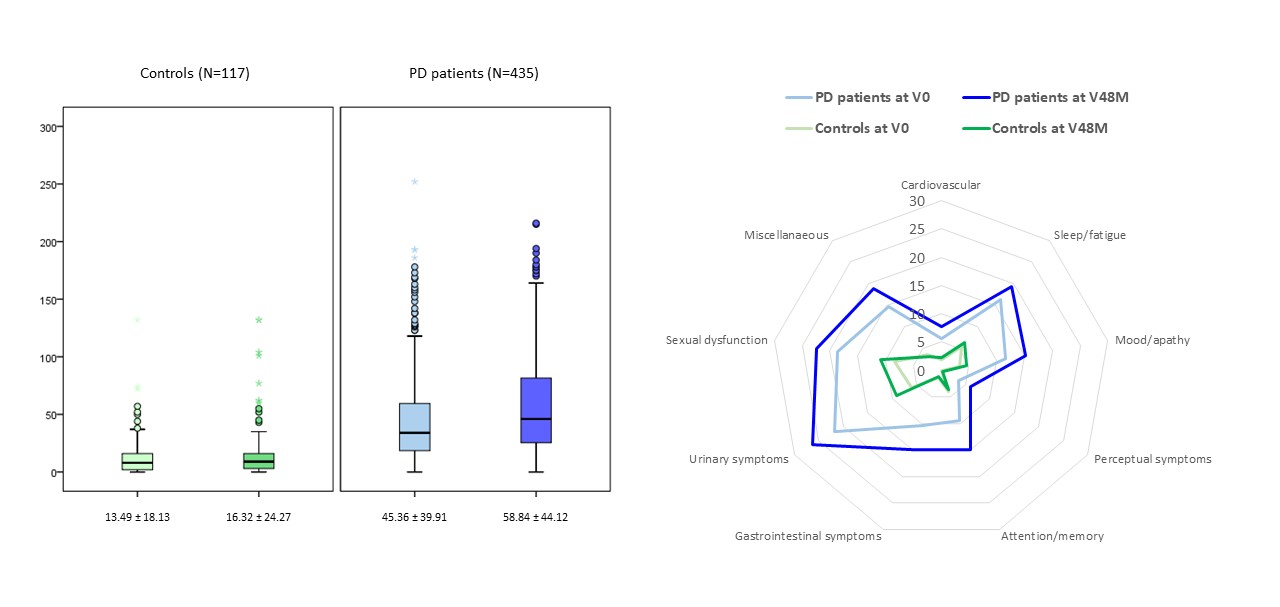Category: Parkinson's Disease: Non-Motor Symptoms
Objective: The aim of the present study was to know how Non-motor Symptoms (NMS) change over time in patients with Parkinson´s disease (PD) comparing to controls, and specifically to determine which of them progress more.
Background: NMS are frequent and progress along time in PD patients. To identify which NMS progress more is important to take into account in daily clinical practice.
Method: PD patients and controls, who were recruited from January/2016 to November/2017 (baseline visit; V0) and evaluated again at 4-year follow-up (V48M; 48 months ± 3 months) from 35 centers of Spain from the COPPADIS cohort [1,2], were included in this analysis. NMS were assessed with the NMSS (Non-motor Symptoms Scale). General linear model repeated measures were used to test for changes in the NMSS total score (NMS burden) and the score for each domain and each item of the scale. Cohen´s d (Cd) formula was applied for measuring the effect size. The Bonferroni method was used to p value correction for multiple comparisons.
Results: Four hundred and thirty five PD patients (62.36 ± 8.8 years old; 57.2% males) and 117 controls (61.68 ± 7.37 years old; 53.8% males) were included. Mean time from symptoms onset was 5.39 ± 4.27 years. In PD patients, the NMSS total score increased moderately (Cd=0.52; p<0.0001) from 45.36 ± 39.91 at V0 to 58.84 ± 44.12 at V48M but not in controls (from 13.49 ± 18.13 to 16.32 ± 24.27; p=0.132). At the end of the follow-up, 56.6% of the patients had a severe or very severe NMS burden (NMSS total score > 40) compared to 41.6% at baseline (p<0.0001). By NMSS domains, the score increased significantly in all of them except sexual dysfunction in PD patients but none in controls (Table 1 and Figure 1). The largest increase were observed in “Gastrointestinal symptoms” (Cd=0.51) followed by “Perceptual symptoms” (Cd=0.32) and “Miscellaneous” (Cd=0.32). By items, a significant (p ≤ 0.001) increase was detected in 16 of 30 items of the NMSS, being the largest effect observed in “Constipation” (Cd=0.45) followed by “Taste/smell change” (Cd=0.36), “Loss of interest” (Cd=0.32), “Swalloging” (Cd=0.31) and “Fatigue” (Cd=0.31).
Conclusion: NMS burden increased moderately after a 4-year follow-up in PD patients but not in control. All NMS domains increased except sexual dysfunction, being the largest effect for gastrointestinal symptoms, including constipation and swalloging.
References: 1. Santos-García D, Mir P, Cubo E, et al.; COPPADIS Study Group. COPPADIS-2015 (COhort of Patients with PArkinson’s DIsease in Spain, 2015), a global–clinical evaluations, serum biomarkers, genetic studies and neuroimaging–prospective, multicenter, non-interventional, long-term study on Parkinson’s disease progression. BMC Neurol 2016;16:26.
2. Santos García D, Jesús S, Aguilar M, et al.; COPPADIS Study Group. COPPADIS-2015 (COhort of Patients with PArkinson’s DIsease in Spain, 2015): an ongoing global Parkinson’s disease project about disease progression with more than 1000 subjects included. Results from the baseline evaluation. Eur J Neurol 2019;26:1399-1407.
To cite this abstract in AMA style:
D. Santos, T. de Deus, C. Cores, M. Feal Painceiras, I. García-Díaz, M. íñiguez, J. Paz González, S. Jesús, M. Cosgaya, J. García Caldentey, N. Caballol, I. Legarda, J. Hernández Vara, I. Cabo, L. López Manzanares, I. González Aramburu, M. Avila, V. Gómez Mayordomo, V. Nogueira, J. Dotor, C. Borrué, B. Solano, M. álvarez Sauco, L. Vela, S. Escalante, E. Cubo, Z. Mendoza, J. Martínez Castrillo, P. Sánchez Alonso, M. Alonso Losada, N. López Ariztegui, I. Gastón, J. Kulisevsky, M. Seijo, C. Valero, R. Alonso Redondo, M. Buongiorno, C. Ordás, P. Martínez Martín, P. Mir, C. Coppadis. Non-motor Symptoms Progression in Parkinson´s Disease. A 4-year Follow-up Study. [abstract]. Mov Disord. 2023; 38 (suppl 1). https://www.mdsabstracts.org/abstract/non-motor-symptoms-progression-in-parkinsons-disease-a-4-year-follow-up-study/. Accessed January 16, 2026.« Back to 2023 International Congress
MDS Abstracts - https://www.mdsabstracts.org/abstract/non-motor-symptoms-progression-in-parkinsons-disease-a-4-year-follow-up-study/



